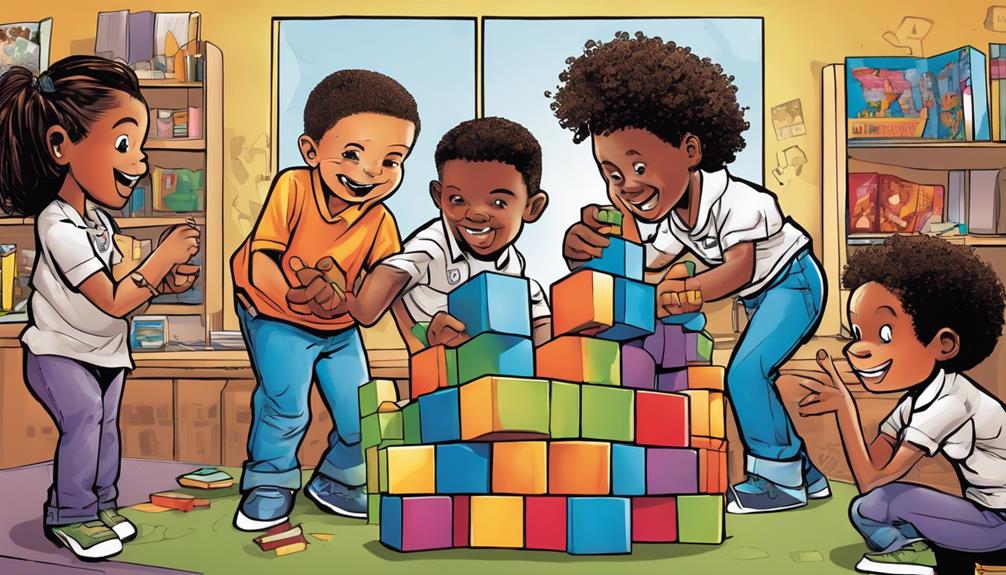Empowering kids with essential life skills is a life-changing journey provided by Role Models.me. Established in 2014, this organization’s goal is to impact a million children by fostering resilience, communication, and leadership skills. Positive feedback from parents emphasizes increased confidence and better problem-solving abilities. Through engaging activities and a ‘serious fun’ teaching method, children learn important skills like teamwork and decision-making. Customized programs and school support ensure children are prepared for success in the modern world. To learn more about how Role Models.me is shaping future leaders and communicators, click here.
Key Takeaways
- Courses focus on resilience, leadership, teamwork.
- Develop decision-making abilities for effective leadership.
- Interactive activities enhance communication and critical thinking.
- Tailored programs for essential life skills and childcare.
- Address parental concerns with specialized E-Safety programs.
Mission and Vision
Our mission at Role Models.me is to inspire and empower children to cultivate essential life skills that will equip them for a successful future.
Founded in 2014 by Hugo, a former corporate worker, our organization aims to guide children towards improving the world through developing strong relationships, innovative ideas, fulfilling careers, and a sense of purpose.
We aim to impact a million children by imparting vital skills such as communication, collaboration, critical thinking, problem-solving, and leadership.
Our focus lies in nurturing children's confidence and character to prepare them for the challenges of tomorrow.
Additionally, we address parental concerns by offering guidance on E-Safety and education.
Through our programs, we aim to shape resilient and capable individuals ready to thrive in the 21st-century world.
Key Life Skills Offered

Role Models.me provides essential life skills courses focusing on resilience, leadership, and teamwork for children aged 8-14 years old. These courses aim to equip children with the necessary skills to navigate challenges, lead effectively, and collaborate with others.
By focusing on resilience, children learn to bounce back from setbacks and adapt to change. Leadership training helps them develop decision-making abilities and inspire others. Teamwork skills are emphasized to foster cooperation and effective communication in group settings.
The courses offered by Role Models.me aim to empower children with these key life skills, preparing them for success in the 21st-century world by nurturing their confidence and character development.
Positive Parent Feedback

Parental feedback regarding Role Models.me's life skills courses has been overwhelmingly positive. Here are some key points highlighted by parents:
- Increased confidence and self-esteem in their children
- Improved communication and teamwork skills
- Positive changes in their children's problem-solving abilities
- Appreciation for the 'serious fun' approach to teaching essential life skills
- Recognition of the relevance of the skills taught for success in the 21st-century world
Innovative Teaching Approach

Parents have noted the effectiveness of Role Models.me's innovative teaching approach in instilling essential life skills in children aged 8-14 years old. This approach combines interactive activities with educational content to engage children in learning key skills such as communication, collaboration, critical thinking, problem-solving, and leadership. By making learning a fun and interactive experience, Role Models.me guarantees that children not only grasp these skills but also enjoy the process, leading to better retention and application in real-life situations. The table below illustrates the diverse range of activities incorporated into their teaching approach to cater to different learning styles and interests.
| Learning Activity 1 | Learning Activity 2 | Learning Activity 3 | Learning Activity 4 | Learning Activity 5 |
|---|---|---|---|---|
| Role-playing scenarios | Outdoor team-building exercises | Creative arts and crafts | Technology-based projects | Group discussions and debates |
Support for Schools and Parents

Educational institutions and families can access valuable support through Role Models.me's initiatives aimed at enhancing children's essential life skills.
Role Models.me provides the following support for schools and parents:
- Tailored courses and childcare services to develop vital skills not typically covered in traditional school curricula.
- Assistance in preparing children for future work by focusing on communication, collaboration, critical thinking, problem-solving, and leadership skills.
- Booking options available for upcoming programs such as the Easter Resilience course and various childcare services through Club Hub and the Role Models website.
- Parental concerns like E-Safety and education are addressed through specialized programs and resources.
- Positive feedback from parents on the progress and increased confidence observed in children who participate in Role Models.me's courses.
Frequently Asked Questions
How Can Role Models.Me's Life Skills Courses Help Children With Social Anxiety?
Role Models.me's life skills courses can help children with social anxiety by providing tools for resilience, leadership, and teamwork. Through a focus on key 21st-century skills and a 'serious fun' teaching approach, children build confidence and social abilities.
What Specific Activities Are Included in the 'Serious Fun' Teaching Approach?
The 'serious fun' teaching approach at Role Models.me includes engaging activities like team-building games, creative problem-solving challenges, and leadership simulations. These activities foster skills like resilience, collaboration, and critical thinking in children.
Do Role Models.Me's Courses Offer Support for Children With Learning Disabilities?
Role Models.me's courses offer extensive support for children with learning disabilities, focusing on enhancing their skills in communication, collaboration, critical thinking, problem-solving, and leadership. Tailored programs aim to empower every child for future success.
How Does Role Models.Me Address Children's Mental Health and Well-Being?
In addressing children's mental health and well-being, Role Models.me employs a holistic approach encompassing emotional support, skill-building, and fostering resilience. Through targeted programs and nurturing environments, they aim to equip children with the tools to navigate life's challenges successfully.
Are There Any Resources or Tools Provided to Parents to Continue Skill Development at Home?
Role Models.me provides parents with resources and tools to foster ongoing skill development at home. Through tips, articles, and guidance on topics like internet safety, programming for kids, and promoting digital resilience, parents can support their children's growth.
Conclusion
To sum up, Role Models.me serves as a beacon of light in guiding children towards a brighter future.
Just as a lighthouse guides ships safely to shore, this organization navigates young minds through the turbulent waters of life, equipping them with the essential skills needed to succeed in the 21st century.
With a focus on resilience, leadership, and teamwork, Role Models.me empowers children to sail confidently towards their goals and dreams.










